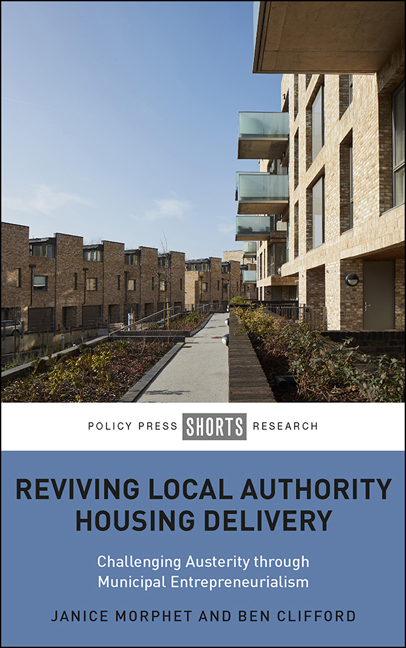 Reviving Local Authority Housing Delivery
Reviving Local Authority Housing Delivery Book contents
- Frontmatter
- Contents
- List of Figures and Tables
- Preface
- One Introduction: Local Government in England and the Twin Crises of Austerity and Housing
- Two Local Government, Housing and Planning in the UK: a History
- Three Challenging Austerity: Why Have Local Authorities Been Taking Their Own Action?
- Four Overcoming Austerity Effects Through Local Authority Direct Action?
- Five Austerity’s Legacy: Risk, Opportunity and a New form of Central– Local Relations?
- References
- Index
Preface
Published online by Cambridge University Press: 18 March 2021
- Frontmatter
- Contents
- List of Figures and Tables
- Preface
- One Introduction: Local Government in England and the Twin Crises of Austerity and Housing
- Two Local Government, Housing and Planning in the UK: a History
- Three Challenging Austerity: Why Have Local Authorities Been Taking Their Own Action?
- Four Overcoming Austerity Effects Through Local Authority Direct Action?
- Five Austerity’s Legacy: Risk, Opportunity and a New form of Central– Local Relations?
- References
- Index
Summary
Since 2010, local authorities in England have experienced a period of government austerity, which has placed them under considerable stress as they strive to continue to meet the needs of their communities. At the same time, there has been mounting pressure to support the delivery of housing in their areas and meet increasing levels of homelessness. While the focus of the Localism Act 2011 was on housing and neighbourhood planning, the first part gave local authorities some general powers of competence that allowed them to operate in the same way as private sector organisations. This offered some new opportunities to return to municipal entrepreneurialism and reminded local authorities of some of their existing powers for the provision of housing, development and energy. Gradually, while the government has been diverted by Brexit, councils have been finding new ways to deliver housing and beginning to act as patient investors. They have started with small projects and have gradually increased their activity to provide more independence for their long- term future. Now, there is a wider view emerging that the only way that the country will provide the number of homes that it needs will be to return to a major social housing programme.
We have been interested in understanding how these changes have been emerging and, through two research projects (one in 2017 and one in 2019), we have been able to hear at first hand local authorities’ experiences and ambitions for their areas. We have heard how councillors want to take more control of the quality, range, type and tenure of the housing provided in their areas than what is offered through current mechanisms, particularly private developers operating through the planning system. Local authorities are aware of the risks but also see that these approaches give them potentially greater freedom in meeting their local needs over the longer term. These approaches are worth some reflection and have implications for the operation of the local state.
We have both had lives that are steeped in local and central government and the academy. The finishing touches to this book are being made as the COVID- 19 pandemic changes all our lives. As the pandemic has illustrated, local government in England has been initially marginalised in the response but is, and should be, central to securing control of the disease.
- Type
- Chapter
- Information
- Reviving Local Authority Housing DeliveryChallenging Austerity Through Municipal Entrepreneurialism, pp. v - viiiPublisher: Bristol University PressPrint publication year: 2020


